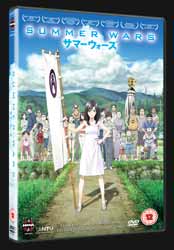|
Click here to return to the main site. DVD Review
Kenji Koiso, is a maths genius, who gets a nose bleed every time he get stressed and not the sort of guy that girls chase. So, when the most popular girl in the school, Natsuki, asks his to accompany her to her granny's birthday he is delighted. Kenji’s world is dominated by OZ, a virtual environment section of the Internet, which has grown to encompass the world with billions of people living virtual lives in its servers. Having arrived at Natsuki’s ancestral home an anonymous sender texts a maths puzzle to Kenji’s phone. Unable to resist he solves the puzzle only to discover that he has given an AI virus access to OZ. When the AI starts to take over OZ the authorities think that it is Kenji and issue an arrest warrant... Summer Wars (2009 - 1 hr, 48 min, 37 sec) is a science fiction anime film directed by Mamoru Hosoda (The Girl Who Leapt through Time (2006)) and co-written by Satoko Okudera. Although this is a much lauded anime film, it is not without its faults. When Kenji gets to Natsuki’s ancestral home, he is introduced to granny as Natsuki's boyfriend, which comes as a surprise to Kenji. But Natsuki begs him to go along with the deception as granny had promised not to die until she had met her future son-in-law. Granny is the matriarchal centrepiece of the whole family, whose frail body belies the steel of her character. It is pretty clear that this squabbling group of people might just implode without her influence. The depiction of the family, and their dynamics, is certainly the strongest element of the film. They squabble and love just like a real family, more so, as seen through the eyes of Kenji, who realises just how precious this is, as he is lacking this form of closeness in his own family. With the growth of social networks and some people really moving their personal lives online, it was only a matter of time before a film went some way to addressing this phenomena. Unfortunately Summer Wars has only a little to say on the subject, or its cultural impact, as the threat to OZ, including all of the participants avatars, is instantly forgotten once the AI has been dealt with. But then this is not really the point of the film, as OZ is a peculiarly Japanese creation, too cutesy to really have become so ubiquitous in the world. Visually OZ is bright, brash, full of cartoon primary colours, which is in contrast to the softer, more natural colours used to portray the real world. In the real world, the blossoming romance between Kenji - initially the fake boyfriend - and Natsuki feels, realistic. The film does have a few comedy moment in the first act of the film, but once Kenji cracks the mysterious math problem, which has been texted to him, the romance is placed to one side as the family overcome their internal issues to band together to fight the menace of the AI. There has been a lot of praise heaped upon this film, so I kinda feel like the only kid in the playground who thinks that, stripped away from the part of the narrative concerning the family, that the rest is little more than the bastard child of WarGames and Tron. Visually, I also thought that the film lacked a depth of detail that I would expect from a major anime release, though the second criticism is more about personal choice than any failure of artistic intent on the part of the animators. Ultimately, the family scenes are so much better scripted and believable, therefore the more enjoyable part of the film. In a nutshell it was a very good, but not great, film. As an aside, and I know this is the DVD review, if you want to get the Blu-ray version of The Girl Who Leapt through Time, the only way to do this is to buy the combo Blu-ray with both films, as there are currently no plans to release The Girl Who Leapt through Time on Blu-ray on its own. Even in its DVD form the 1.85:1 anamorphic transfer looks crisp and bright, from the stark OZ, to the Shinhara family home. Both the 5.1 English and Japanese vocal work do not diminish the film. The extras kick off with an interview with Mamoru Hosoda (13 min, 04 sec), who takes a look at the international response to the film as well as putting it into a historical perspective with the rest of his work, in Japanese with subtitles. Stage Greetings (19 min, 58 sec) has the cast turning up to introduce the film and answer some questions, a piece full of information and even fuller of that peculiar form of Japanese silliness which defies personal embarrassment. The cast interviews are more Q&A, and after the first extra, there is a little crossover between the two, but I guess there is only so much you can say about the film. The disc is rounded out with TV Spots and various trailers. The film is well worth adding to your collection. Its heart-warming story should be enjoyed by all the family, whilst the conflict is mild enough not to put younger members of the audience off. 8 Charles Packer |
|---|

